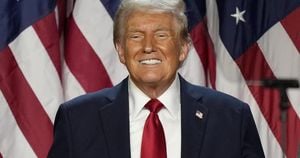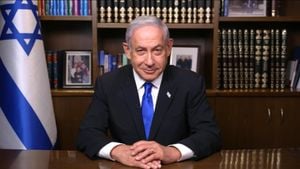A storm of controversy is brewing over the International Criminal Court's (ICC) recent decision to issue arrest warrants for Israeli Prime Minister Benjamin Netanyahu and former Defense Minister Yoav Gallant, amid the turbulent backdrop of the Israel-Hamas conflict. The ICC, which operates to address alleged war crimes, stated the warrants were part of its attempt to enforce accountability for actions potentially deemed as targeting civilians during the war. This bold move has ignited fierce discussions both within and outside Israel, as various political factions and international leaders weigh their stances on the matter.
Netanyahu's government responded swiftly, critiquing the ICC’s actions as unjust and politically motivated. The prime minister, who has been criticized for his heavy-handed military response to the Gaza crisis, faces accusations of leading attacks on civilian populations, which reportedly resulted in thousands of casualties. This has led to claims from ICC officials, including its chief prosecutor, about Netanyahu and Gallant committing war crimes.
At the heart of this situation lies the tragic humanitarian crisis enveloping Gaza. Following Hamas' shocking attack on October 7, 2023, which led to staggering casualties on both sides, heightened tensions have dominated the region. The current Israeli military offensive has escalated, causing significant civilian suffering. While Netanyahu argues he is defending his nation against terrorism, the rising civilian death toll has provoked vehement international scrutiny.
Among the vocal critics is Turkish President Recep Tayyip Erdogan, who lauded the ICC's warrants as "courageous" and necessary to restore faith in international justice. Erdogan emphasized the importance of accountability, describing the warrants as pivotal. He urged Western nations, who historically advocate for justice and human rights, to honor their commitments by supporting the ICC's initiatives.
On the other hand, the American administration, under President Joe Biden, rejected the ICC's jurisdiction over U.S. citizens and indicated it viewed the warrants as "outrageous." Biden’s administration has historically had strong ties to Israel, providing substantial military aid and overt support, complicates the U.S. position. This backing contributes to the tensions surrounding the ICC’s actions and raises questions about the U.S.'s role and accountability.
Republican Senator Lindsey Graham took the stance of imposing consequences on any allied nation contemplating the arrest of Netanyahu or Gallant. He expressed this position vehemently, stating he would support sanctions against countries aiding the ICC. Graham's words resonate with many who feel aligning with the ICC could undermine longstanding U.S.-Israel relations.
Support for the ICC's actions has come from various corners, including several European leaders who have indicated their willingness to uphold the warrants if Netanyahu sets foot on their land. Countries such as Canada, Ireland, and Spain have publicly acknowledged their obligation to respect the ICC's directives, setting the stage for potential diplomatic friction.
The Israeli government's reaction has been multifaceted, reflecting both outrage and defiance. Netanyahu's administration claims the ICC is targeting Israel as it seeks to defend itself against terrorism, portraying the warrants as part of larger anti-Israel sentiments. The prime minister's critics within Israel argue his policies have drawn international backlash and painted the country negatively on the global stage.
The humanitarian fallout is undeniable, with organizations highlighting the dire conditions faced by civilians trapped within Gaza. Reports indicate severe shortages of food, medical supplies, and clean water, exacerbated by continued conflict. Many Palestinian voices hope for genuine international intervention and support, seeing the ICC's actions as merely symbolic without substantial diplomatic change.
The historical importance of the ICC cannot be understated, as it acts as a governance mechanism aimed at preventing atrocities worldwide. The clash between nations’ commitments to the ICC and their political alliances creates an inflection point. Where does responsibility lie when civilians are caught between the objectives of nation-states?
Critics assert the ICC's warrants may inadvertently complicate humanitarian efforts. Without tangible steps toward ceasefire or negotiations, many question the feasibility of achieving lasting peace through legal pursuits alone. The armed conflict's swift pace and unpredictable nature leave humanitarian sentiments often drowned by military strategies.
Simultaneously, discussions on Netanyahu’s future and the Israeli government’s path forward remain pertinent. Calls for accountability evolve as the body count continues to rise, presenting tough ethical questions as Israeli losses compound. How much tragedy is necessary before the international community can draw clear lines on war crimes? Has the ICC's intervention now become part of the heated ideological battle surrounding the conflict?
Clearly, the situation is fluid. The ICC's warrants have led to varied responses globally, with numerous states grappling with their obligations as signatories to international treaties. Some analysts predict these actions could isolate Israel diplomatically, as nations are caught between commitment to long-standing alliances and the ethical imperative to draw lines against international law violations.
While international law is intended to uphold justice, it reiterates the importance of human dignity and suffering. If nothing else, the developments surrounding these warrants signal the urgency for dialogue, humanitarian intervention, and possibly the need to redefine alliances and responsibilities on the world stage.
Despite the political turbulence, history will note not just the decisions made but the humanitarian cost attached. The ICC's role will likely evolve, serving as both arbiter and symbol of justice amid chaos. Ensuring accountability for leadership decisions during wartime continues to be complex, and this moment stands as testimony to the intertwined fates of justice and political maneuvering.



